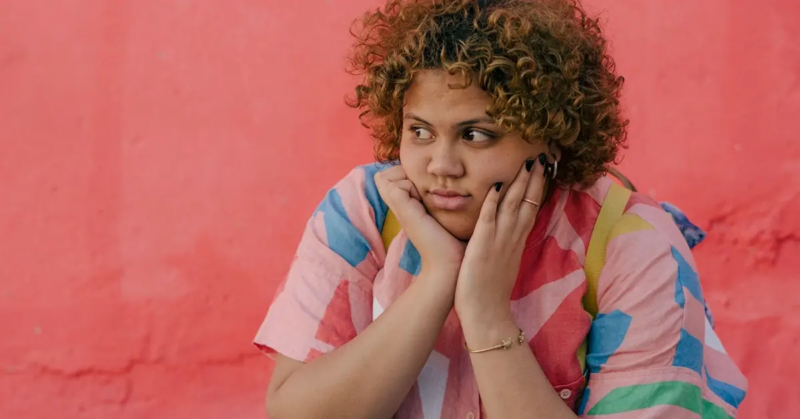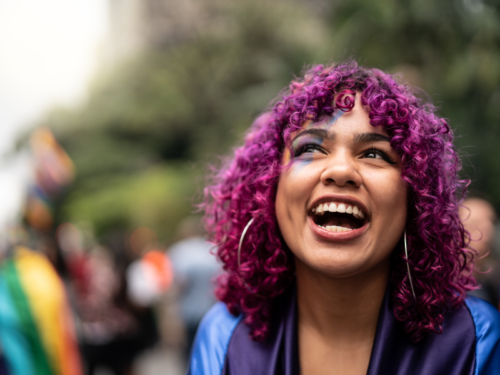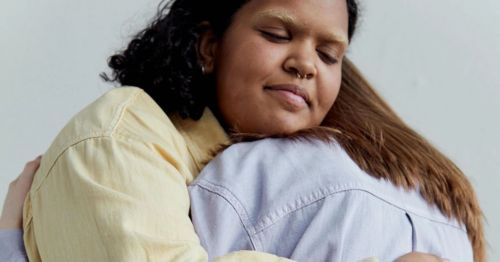
Table of Contents
Everything You Need to Know About LGBTQIA+ Counseling
Written By: Charlie Health Editorial Team

Clinically Reviewed By: Dr. Don Gasparini
Updated: October 27, 2023
6 min.
LGBTQIA+ counseling fits into the umbrella of LGBTQIA+-affirming care, which recognizes and validates the experiences of all LGBTQIA+ people and serves as a safe space to discuss the intersection of sexual orientation and mental well-being.
Learn more about our Clinical Review Process
Table of Contents
Trigger warning: Suicide. If you’re experiencing suicidal thoughts or are in danger of harming yourself, this is a mental health emergency. Contact The Suicide & Crisis Lifeline 24/7 by calling or texting 988.
Everyone deserves access to equitable physical and mental healthcare, and for those who are members of the LGBTQIA+ community, that care may include LGBTQIA+ counseling. Falling under the umbrella of LGBTQIA+-affirming care, this kind of therapy recognizes and validates the experiences of all LGBTQIA+ people—those who are lesbian, gay, bisexual, transgender, queer, questioning, intersex, and asexual/aromantic/agender, “plus” all other identities along the gender and sexuality spectrum.
Like traditional psychotherapy, LGBTQIA+ therapy provides a safe environment for discussing mental health concerns and building healthy coping skills. It also specifically focuses on the intersection of sexual orientation, gender identity, and mental well-being.
The state of LGBTQIA+ mental health
LGBTQIA+ mental health problems are unfortunately common, especially among LGBTQIA+ teens and adolescents. According to a recent Centers for Disease Control (CDC) study, nearly one-quarter of LGBTQIA+ students were bullied at school, and nearly 30% were cyberbullied.
The psychological consequences of bullying, microaggressions, and discrimination can be devastating. Studies consistently show that discrimination is a significant source of distress and anxiety for lesbian, gay, bisexual, and transgender people. For example, compared to non-LGBTQIA+ youth, adolescents who are lesbian, gay, bisexual, or transgender are about four times as likely to experience suicidal ideation and attempt suicide, according to CDC data. These LGBTQIA+ young people are also three times as likely as their non-LGBTQIA+ peers to experience depression and engage in self-harm, data shows. According to research, LGBTQIA+ youth are also more likely to seek therapy, experience a substance use disorder, and receive a mental health diagnosis.

You deserve affirming, industry-leading care
Virtual groups, individual counseling, and family therapy for LGBTQIA+ youth.
What issues does the LGBTQIA+ community face?
While significant progress has been made in recent years, the LGBTQIA+ community still faces discrimination and inequality worldwide. Here are some specific challenges that this community faces, which may be risk factors contributing to a disproportionate rate of psychological concerns among some LGBTQIA+ teens and young people.
Discrimination
As mentioned, LGBTQIA+ people often face discrimination in various aspects of life, such as employment, education, healthcare, and housing. This discrimination can take the form of overt prejudice, more subtle microaggressions, or systemic inequities. For example, LGBTQIA+ people may be discriminated against when it comes to marriage equality, adoption rights, legal recognition of gender identity, access to gender-affirming care, and more.
Coming out/inviting in
How and when to “come out” (or, as we like to say at Charlie Health, “inviting in”) can be a challenge that LGBTQIA+ people face. For some, coming out to close friends, family members, and loved ones can be liberating. However, for others who don’t have a supportive home or community environment, expressing their identity can come at a high cost.
Complex trauma
As mentioned, the LGBTQIA+ community faces multiple forms of discrimination, which can take a toll on mental health. Homophobia, transphobia, stigma, and identity-specific bullying can be traumatic. Unfortunately, exposure to trauma can contribute to a heightened risk of post-traumatic stress disorder (PTSD) among LGBTQIA+ people, research shows.
Substance abuse
Substance use is common in the LGBTQIA+ community, and some LGBTQIA+ people may turn to substances to cope with mental health issues. LGBTQIA+ adults are nearly twice as likely as non-LGBTQIA+ adults to experience a substance use disorder, research shows. Also, transgender people are almost four times as likely as cisgender people to struggle with substance abuse, according to studies.
Homelessness
LGBTQIA+ youth face a significantly higher risk of homelessness than their non-LGBTQIA+ peers—often due to family rejection or discrimination. According to one research study, 8% of transgender adults and 3% of sexual minorities faced homelessness in 2019 compared to 1% of non-LGBTQIA+ adults.
Why is LGBTQIA+ counseling important?
LGBTQIA+ counseling is important because it provides a safe and supportive space for those within the LGBTQIA+ community to address unique challenges and issues they may face related to their sexual orientation, gender identity, or expression. These specialized counseling services offer a non-judgmental environment where people can openly explore and discuss their feelings, experiences, and concerns, especially those related to coming out, discrimination, or family acceptance.
Also, LGBTQIA+ counseling can help people navigate the complexities of identity, providing tools and strategies to build self-acceptance and resilience. LGBTQIA+-affirming therapists can serve as allies, advocates, and sources of information, helping clients access community resources and connect with a network of understanding peers.
Mental health support that’s tailored to the LGBTQIA+ community can address the higher prevalence of mental health issues and suicide rates within this community, offering coping mechanisms and resources. LGBTQIA+ counseling is essential for promoting mental well-being, self-affirmation, and a sense of belonging within a community that has historically faced discrimination and stigmatization.
What’s the difference between LGBTQIA+ therapy and conversion therapy?
LGBTQIA+ therapy
Conversion therapy
- Recognizes and validates the experiences of LGBTQIA+ people
- Supportive and affirming
- Evidence-based
- Attempts to change a person’s sexual orientation, gender identity, or gender expression
- Harmful and coercive
- Not evidence-based
LGBTQIA+ therapy recognizes and validates the experiences of LGBTQIA+ people. Conversely, conversion therapy attempts to change a person’s sexual orientation, gender identity, or gender expression, which is impossible at best and harmful at worst.
However, conversion therapy can be insidious. Since the practice has come under more scrutiny in recent years, some conversion therapy practices have changed their terminology to avoid detection. To protect your mental wellness, absolutely avoid choosing therapists who compare the altering of sexual orientation, gender identity, or gender expression with the treatment of a diagnosable mental illness. Some practitioners may claim that they’re helping clients “cure” or “repair” issues like “gender confusion” or “unwanted same-sex attractions.” This is not evidence-based in any way and does not offer true LGBTQIA+-related support.
If you ever feel ashamed, uncomfortable, or judged during therapy sessions, trust your gut and end contact with that therapist. LGBTQIA+ therapy should never look like conversion therapy. A sexuality- and gender-affirming therapist will never attempt to change your sexual orientation, gender expression, or gender identity—and counseling should never feel like coercion.
How can you find the right counselor?
Finding the right therapist can feel like a daunting task. You need someone with the training to treat your specific mental health issues who offers affirming therapy (and ideally has years of experience working with LGBTQIA+ clients). Most importantly, you need someone who respects your identity and creates a safe space to navigate the therapeutic process, according to the American Psychological Association, which published a best-practices guide for clinicians working with “sexual minority persons.”
To start your search, consider asking for recommendations from LGBTQIA+ friends, support groups, or community organizations that may know therapists practicing LGBTQIA+ affirmative therapy. Utilize online directories that specialize in LGBTQIA+-friendly mental health professionals to search for therapists who match your location and specific needs. If you live in an area with limited access to LGBTQIA+-friendly counselors, you can explore online therapy options. Many therapists offer remote sessions, which can be a convenient way to access affirmative therapy.

Once you’ve narrowed down your list, don’t hesitate to contact potential counselors and ask questions about their experience and training in LGBTQIA+ issues. It’s crucial to schedule an initial session to assess compatibility and ensure that the mental health professional respects your identity and experiences.
Remember that finding the right counselor is a personal journey, and prioritizing your comfort and support is key. Whether you’re dealing with gender dysphoria, exploring gender expression, or experiencing general mental health concerns, you can greatly benefit from working with a mental health professional who understands and affirms your LGBTQIA+ identity.
LGBTQIA+ counseling at Charlie Health
If you or a loved one are looking for LGBTQIA+ counseling, Charlie Health is here to help.
Our virtual Intensive Outpatient Program (IOP) offers more than once-weekly counseling to young people with complex mental health conditions and their families—including young people struggling with sexual identity issues and gender dysphoria. Charlie Health’s expert clinicians offer LGBTQIA+-affirming therapy in group sessions, individual counseling, and family therapy contexts. In fact, our program offers a specific LGBTQIA+ track to ensure that those seeking affirming online therapy can connect with people with similar life experiences.
Regardless of your sexual identity, gender identity, or gender expression, you deserve supportive mental healthcare. Fill out this short form to see today if Charlie Health is a fit.
References
https://www.stopbullying.gov/bullying/lgbtq
https://www.cdc.gov/healthyyouth/data/abes/tables/sexual_identity.htm#MH
https://pubmed.ncbi.nlm.nih.gov/28565925/
https://www.frontiersin.org/articles/10.3389/fpsyg.2022.726343/full
https://www.ncbi.nlm.nih.gov/pmc/articles/PMC3395766/
https://www.liebertpub.com/doi/pdf/10.1089/trgh.2019.0029
https://www.sciencedirect.com/science/article/pii/S0022395620311316
https://williamsinstitute.law.ucla.edu/publications/lgbt-homelessness-us/
https://www.apa.org/about/policy/psychological-sexual-minority-persons.pdf





